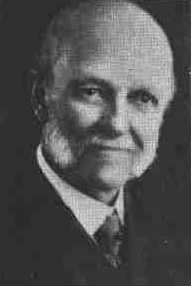
The grandest fact in history is that Jesus Christ, the Lord of Glory, has been in this world.
And the most important fact of the present is that He is now in Heaven making intercession for us [we who are believers in the Lord Jesus and are trusting Him for our salvation] (Heb. 7:25; Rom. 8:34; 1 John 2:1).
And the greatest prophesied event of the future is, that He is coming again.
These three appearings are beautifully set forth in the 9th of Hebrews (Heb. 9:24, 26, 28).
His appearing upon earth "to put away by the sacrifice of Himself." Verse 26.
His entering "into Heaven itself, now to appear in the presence of God for us." Verse 24.
"And unto them that look for Him shall He appear the second time without sin unto salvation." Verse 28.
While He was here upon earth He said: "It is expedient for you that I go away" (John 16:7) and He went away (Acts 1:9). He said, "I go to prepare a place for you." But
He Promised,
"If I go and prepare a place for you, I will come again, and receive you unto myself; that where I am, there ye may be also." John 14:2-3. He gave us this promise as our hope and comfort while He is away.
He said: "In the world ye shall have tribulation" (John 16:33), "ye shall weep and lament, and ... be sorrowful but I will see you again, and your heart shall rejoice." Verses 20, 22.
Nothing can be more comforting to the Church, the bride of Christ (Eph. 5:25-32), then this precious promise which our absent Lord has left us, that He will come and receive us unto Himself, and that we shall be with Him, to behold His glory (John 17:24).
He has given us
The Lord's Supper,
that we should take the bread and the cup in remembrance of Him (Luke 22:19), and to show His death, till He come (1 Cor. 11:26). We have this simple and loving memorial for a continual sign of this promise during all the earthly pilgrimage of the Church (Heb. 11:13; 1 Peter 2:11), and through it we look forward from the cross to His coming, when He will drink it anew with us, in His Father's kingdom (Matt. 26:29), at the marriage feast of the Lamb (Matt. 22:2; Rev. 19:9; also Luke 14:16-24).
It is a constant reminder of His promise, pointing our eye of faith to His coming again. "He is faithful that promised" (Heb. 10:22-25) and we are exhorted to have confidence and patience, that we may "receive the promise," "for yet a little while, and He that shall come will come, and will not tarry." Heb. 10:35-37.
One has truly said that the coming of Christ is
The Very Pole Star of the Church,
And the apostle Paul calls it "That blessed hope" (Titus 2:13). Jesus and the apostles and the prophets have given great prominence in the Scriptures to this inspiring theme. THE EARLY FATHERS and the Christian Church, for the first two centuries of our era, found in it their chief source of hope and comfort. The belief that Jesus was coming in glory to reign with His saints on the earth, during the Millennium, was almost universal with them.
But in the third century there arose a school of interpreters, headed by Origen, who so "spiritualized" the Scriptures that they ceased to believe in any literal Millennium whatsoever. Their system of interpretation has been severely condemned by Martin Luther, Dr. Adam Clarke and other commentators.
When Constantine was converted and the Roman empire became, nominally, Christian, it appeared to many that the Millennium had come, and that they had the kingdom on earth. The Church, hand in hand with the world, plunged into the dark ages, until awakened by the great reformers of the sixteenth century, who again began to proclaim the comforting hope and blessed promise of the coming of Christ; and since that time the subject so long neglected has been studied and preached with increasing interest. Indeed, in the last two centuries, it seems to have risen (with the doctrine of salvation by simple faith in a crucified Savior) into somewhat the same prominence which it occupied in the early Church. God be praised for it.
